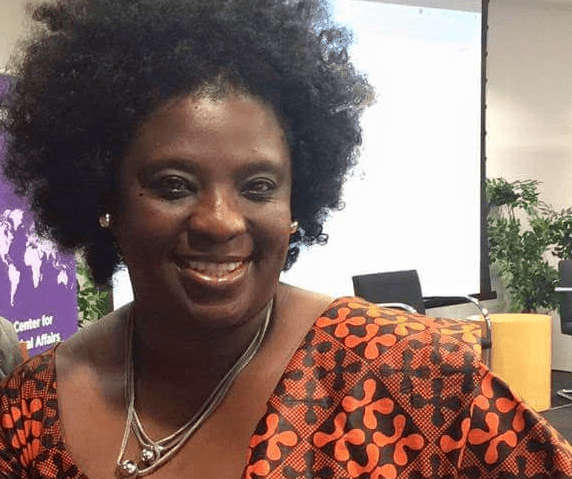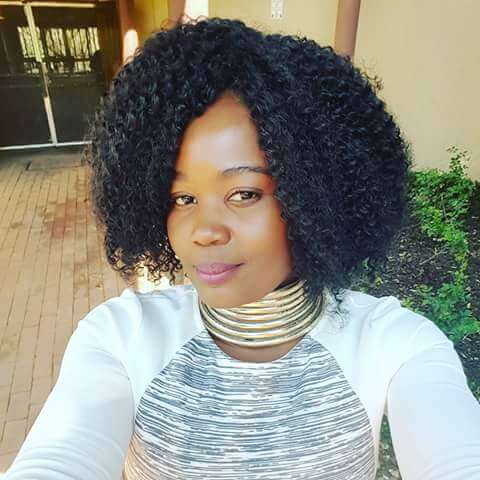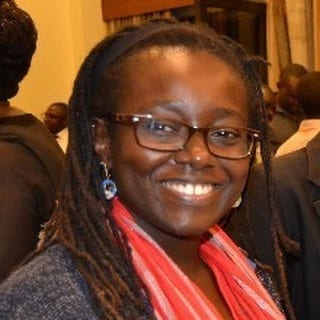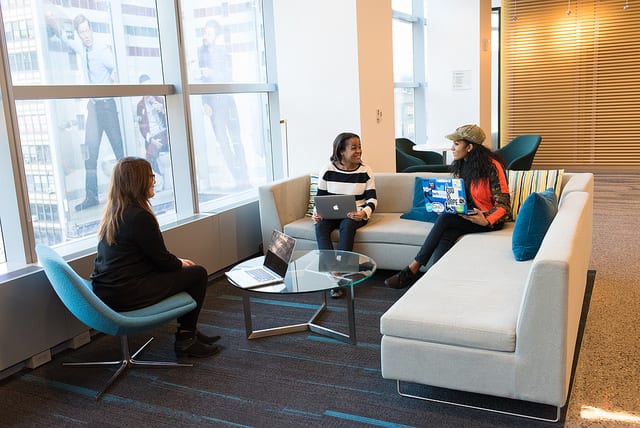Carol Bangura: Operating a non-profit organisation and empowering girls

[bctt tweet=”Top skills you need to run a non-profit org from Carol Bangura, award-winning advocate” username=”SheLeadsAfrica”] Carol Bangura is an educator, advocate, philanthropist, and a published author. Carol’s professional experience includes creating culturally and linguistically appropriate education and social integration programs in the Greater Philadelphia. She’s done this for diverse immigrant and refugee women and children from countries including, but not limited to Sierra Leone (her country of birth), Liberia, Haiti, Ghana, Turkey, China, Jamaica, Mexico, and Iraq. Carol has created education initiatives for girls exposed to school related gender-based violence (SRGBV) in Sierra Leone. As someone who has worked in the non-profit sector, Carol is open to providing insight to others. Here are key takeaways from Carol Bangura’s experiences in the non-profit sector. Carve out your niche “The key piece of advice is to carve out your niche. As women, we are natural nurturers and want to save the world. My brand centers on empowering girls through education and social initiatives.” Carol Bangura has been able to create a cost-effective method of purchasing new books and shipping them locally within the US and internationally to Sierra Leone. Carol shipped the first set of books internationally to Sierra Leone in 2007 and has cultivated relationships in Sierra Leone and in the Greater Philadelphia area. Although she ended her program formally in other countries and in the United States, she still conducts informal book donations to girls (and boys) locally with partner organizations. #MotherlandMogul Tip: First take some time out to discover how you want to improve lives. What are you good at? What do you enjoy doing? Once you’ve outlined this, think of ways you can join your passion with helping others. The two skill you need to successfully run a non-profit “The skills needed in the beginning are fundraising and the ability to have doors close in your face! Everyone will not believe in your dream, you have to believe it yourself. Starting an organization takes funds. And when you’re ready to implement projects, they must go through the phases of planning, implementation, and evaluation.” In a nutshell, you should answer the questions, What are you going to do? How are you going to do it? After you’ve done it, how would you determine its success? [bctt tweet=”Carol Bangura: Soon after launching your non-profit create a strategic and financial plan.” username=”SheLeadsAfrica”] Registering a non-profit organisation “Documentation varies from state to state; and country to country. Research should be conducted to determine what is needed to register an organization. There isn’t a one size fits all checklist to start a nonprofit because it depends on the type of organization, its location, board structure, etc.” Carol’s organisation is registered in the United States and though she operates in Sierra Leone, she’s not familiar with what’s required there. In the US, every state has its own rules and then every municipality does as well. The federal government requires a 401c determination but that process is very complicated and Carol has done it in the past for others as a consultant. #MotherlandMogul Tip: If you’re based in Nigeria, Ivie Eke shares 3 major points on starting and sustaining an NGO here. What do first after launch “Prior to launching and/or within the first six months to a year, a strategic plan should be created. You will also need to create a funding plan.” The key to doing this was trial and error. For years Carol wrote grants before finally obtaining unrestricted funding to carry out her GIRLS! project. “Grant writing is daunting due to the checks and balances, but it’s not impossible to do on your own.” Carol identified planning, implementing, and evaluating as the most important skills to hone to perfection. Final words from the brilliant Carol Bangura; “Nothing comes easy, especially for us as African women who choose nontraditional roles and have the audacity to step out of the box. The pain of my past as a victim of gender-based violence fuels my passion; without passion in what can be a thankless job, you’re more likely to be burned out.” If you’d like to share your story with She Leads Africa, let us know more about you and your story here.
Marcia Lebambo: I want to see my people in better conditions

[bctt tweet=”The Marcia Lebambo Foundation brings Spelling Bees to school learners in townships” username=”SheLeadsAfrica”] Marcia Lebambo is a woman passionate about developing marginalized communities in rural areas. A self-described village girl who came to Gauteng to claim her piece of gold, Marcia is giving back to the community through education in a unique way. Her foundation uses Spelling Bees to educate school children in rural areas and townships in South Africa. Marcia believes Spelling Bees are a great way to encourage confidence in children. Though she works as a senior campus officer and lecturer, Marcia is pursuing her PhD and is still digging for her gold. Tell us about the Marcia Lebambo Foundation The Marcia Lebambo Foundation was established in 2012 as a non-profit organization focusing on teaching school learners in townships and rural areas writing and reading skills. This is done using a popular competition called a Spelling Bee. In the competition, contestants are asked to spell a broad selection of words, usually with a varying degree of difficulty. This is a comprehensive learning process that allows children to learn the definition, pronunciation, and roots of the words. Learning grammar is not the only benefit, learners are able to enhance vocabulary, competitive spirit, greater knowledge, cognitive skills and confidence. Since 2012, over a thousand learners participated in the program. The initiative was motivated by improving the quality of basic education in the country, especially schools in the rural areas and townships. As an organisation, we believe that the fight for quality education cannot be the responsibility of government alone, but every South African. This is the reason why we are extending a hand to your organisation to help change the plight of our education system. What motivated you to starting Spelling Bees in South Africa? Coming from a rural school where the level of education was very poor, I didn’t value myself as a student. So when I joined TUT as a student in 2005, I felt like I didn’t belong and that affected my confidence a lot. After completing my degree, at only 19 in 2007, I then told myself that I cannot sit and feel sorry for myself. I had to do something not only for myself but other kids in similar backgrounds like mine. I wanted to go back and help kids from previously disadvantaged schools learn how to read and write. Because spoken words are written first, if you can master reading and writing you can master the speaking. In 2012, together with a group of volunteers, I founded the Marcia Lebambo Foundation which organises the Spelling Bee competitions. [bctt tweet=”If you can master reading and writing you can master the speaking” username=”SheLeadsAfrica”] Coupled with the rapid pace of social media and technology, writing has become a challenge globally, especially for learners in marginalised communities. I believe that if you cannot spell the word, you cannot read, and if you cannot read, you will not be able to write. We literally go school by school sending invitations and requesting collaborations from school teachers, principals and parents. It is very challenging because it is self-funded. But it is worth it. Do you have a favourite book or read much? I love biographies, they tell a story and invite the reader to meet the person behind the person. I call biographies intimate reads. Currently, I am reading Zuma, A Biography by Jeremy Gordin. In between, I’m also reading a local Author Sy Tshabalala’s book titled Being Positive in a Negative World, Daily Supplements of Inspiration. But the pace has been slow because I am doing my PhD which consumes a lot of time on research books and articles and a lot of writing. What keeps you awake at night? To see my community and people in better conditions than they were yesterday. Being raised by parents with no educational background and being the first in the family to receive a university qualification reminds me that I represent my entire community. That responsibility reminds me that I have to rise above the narrow confines of my individualistic concerns to the broader concerns of all humanity. I am driven by knowing that God has given us powers to be and do anything that we want in life, whether good or bad, the choice lies with us. I am also inspired by ordinary women with no education or employment who use whatever little resources available to sell fruits and vegetables to pay for their children’s education. My question daily is; If they can do it, what stops me? If the late Mandela could move the entire world behind prison bars, what is actually stopping me? That is what inspires me. Why did you choose your profession? I started with a course that I didn’t want to do because I didn’t apply on time to secure a space on the course I wanted which was law. So I went for any that was available and ended with administrative management. I completed it in Cum Laude because I wanted to quickly remove it from my face and register my all-time favourite. But as one can expect, life happened and I ended up doing so many other courses. My qualifications include: Diploma Administrative Management B-tech Strategic Management B-tech Public Management Masters in Entrepreneurship After so many years, it is only now that I have been accepted to study LLB. The plan is to complete my PhD first this year, 2016. I want to be an academic full-time. There still so much work to do especially in the black-dominated universities. [bctt tweet=”Marcia Lebambo was the first in her family to receive a university qualification” username=”SheLeadsAfrica”] How do you define family? Family is strength, family is love, family is light. To me, family is everything. They keep you grounded, when you go up they celebrate with you, when you go down they cry with you. They are our ultimate life cheerleaders. Three of my siblings are part of the Spelling Bee initiative. I must say
Regina Opondo: The Kenyan civil society sector is very exciting

Regina Opondo wears so many hats in the Kenyan civil society sector. She is the Executive Secretary of CRECO, a consortium of 23 civil society organisations in Kenya, Co-Convener for the ‘Kura Yangu Sauti Yangu movement, a platform for political dialogue around Kenyan elections, a Deputy Convener for the Civil Society reference group in Kenya, among others. Regina believes that women work best together and dismisses the saying the women are their own worst enemies. She also says women tend to do very well in civil society as compared to other sectors. If you’ve ever considered starting a career in civil society, this one has lots of gems for you. Why civil society and not a different sector? I always knew that I wanted to help people especially on human rights issues, and for me the civil society was the only way. The civil society sector is also very exciting. There is always something new every day, and there is a feeling of family as we all work together towards specific good. Do you think are the barriers to women’s progress in the sector? I would say there is minimal barrier as women with technical expertise in the sector tend do very well as compared to other sectors like the government and the cooperates. To some extent though, there is the social barrier. I think it is sometimes quite a challenge balancing between work, family and the civil society work. The sector is quite demanding as it requires more hours at work, traveling now and then, active activism and advocacy. Most women with families in the sector have had to tone down after on active participation in their work and are not as active as they were before. They are forced to take less work and take care of other social responsibilities. Does being a woman-led organization give leverage in winning donor funds? I would say yes and no. Yes, because it makes it easier when one is dealing with women-led donor organisations. I have always believed that fundraising is about building relationships and how you relate. You see for women, there are so many things to share. We talk about challenges and how to handle them and freely give advice when needed. Hence, it is easier to pitch agendas and ideas to women for funding. With men on the other hand, it is hard to build relations as relating with some can be quite a challenge. No, because the playing field is the same and the quality of work is what matters. What are your views on the relationship between civil society organisations and the government? There is a general feeling of mistrust and open hostility that manifests itself differently in many African countries, and in Kenya to be specific. The current government has not allowed the civil society organisations (CSOs) to operate freely and there is the new bill in parliament to amend the Public Benefit Organisations Act. The PBO Act aims at protecting freedom of association and allows civil society organisations doing public benefit work to operate under one single Act. The Kenyan government though, has refused to put a commencement date on it. Has your ethnicity ever affected your advocacy work? To some extent it has, as others always believe that since one comes from a specific ethnic community, they are automatically inclined to a specific political party. Hence, they do not tend to be keen on important issues raised but judge your actions, as genuine as they are. What do you do in your free time I love art and craft, watching movies, reading fiction and swimming. I have to try keep fit you know 😉 Any advice to upcoming women leaders? I would say, look for good mentors to serve different purposes in life whether career, spiritual, family and even technical. After you succeed, remember to give back that which has been given to you. Want to see women you know featured on SLA? Tell us what amazing things women are doing in your communities here.
Starting and sustaining an NGO in Nigeria: 3 important things to consider

You can actually set up the next big NGO, and maybe win a Nobel prize for your wonderful contribution to the society. Isn’t that amazing? But wait! Before rehearsing your Nobel prize acceptance speech, have you given enough thought to the sine qua non of setting up and sustaining an NGO? No? It’s not too late. Let’s start with the basics. A Non-Governmental Organization (NGO), according to www.ngo.org, “is any non-profit, voluntary citizens’ group which is organized on a local, national or international level.” In Nigeria, they play important roles, often filling gaps which the government is unable to while complementing existing government activities. These organizations, small or large, work in the health, civil society and other sectors of society. Individuals and groups often set up NGOs with altruistic motives, with the intention of impacting positive societal change. Having worked for an NGO for several years, I know that most people assume that starting and sustaining one is a laid-back affair. On the contrary, it is in fact as critical as starting up a for-profit business. It really does not matter if it is on a small-scale basis, or whether you have vast amounts of cash, there are key guides to consider. Here’s what you need to know. Legal requirements A lot of times, enthusiastic newbies fail to consider the legal requirements of embarking on such a venture. Someone wakes up, scribbles an interesting name for a proposed NGO, then proceeds to print branded T-shirts. That’s not bad for effort, but you need a more structured process. For proper legal status, your NGO must be registered with the relevant body; the Corporate Affairs Commission (CAC). Take ownership of the process, and as much as possible, avoid using a proxy. That way, you will be in possession of all necessary documents and minimize the chances of a disaster. Now, you’ll need to establish the following: The legal obligations it will be subject to. Your goals and objectives. The problems you intend to solve. Equally important, you’ll need a lawyer during this process. Having a lawyer at your side will keep you updated on the rights and obligations of the registered NGO you’ll soon be running. Acquiring and sustaining funds When setting up an NGO, you must be very clear on the source and availability of funds. You can’t begin with the, ‘Well, I just started’ or ‘Let’s see how it goes’ attitude. Having said that, let’s see if you can answer these questions: Do I have funds for the activities I’d like my NGO to embark on? Are there government or other organizations’ grants I can apply for? Can the NGO sustain itself on a long-term basis? Do I have an efficient structure? What are my planned activities, and who will be responsible for each activity? Run your NGO like you would run a business. Look, I get it. The society seriously needs solutions and you’re revved up for the challenge. Your idea is the best, most unique and different one and you’re in line to becoming the next Mother Theresa. Listen though, other NGOs are profit-oriented and well, only focus on making profit. If you want your NGO to be around for a long time, you’ll need to integrate these profit-making elements to your operations: Have a defined strategy for hiring, operations and other organizational processes. Have a strong financial system. Have a target audience? A robust marketing strategy will cater to them. Have a marketing budget. Decide on what strategy to apply. Person-to-person? Social media? Flyers and posters? Or a mix of different strategies? How about record-keeping? Do you have a plan? How often would you produce reports? Bi-monthly, quarterly or annually? The above requirements are essential, especially if your NGO’s activities are grant-funded (which means you’ll have to submit regular reports to your handlers). The sad reality is not everyone gets grants at the start, but proper record-keeping would prove very helpful should you decide to apply for funds in the future. #MotherlandMoguls should know that NGOs are businesses too. Your profit is in the satisfaction of helping people in profound ways.
